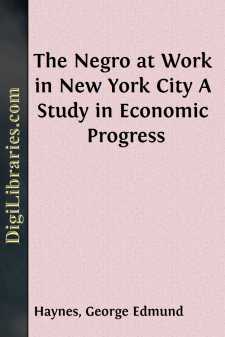Categories
- Antiques & Collectibles 13
- Architecture 36
- Art 48
- Bibles 22
- Biography & Autobiography 813
- Body, Mind & Spirit 142
- Business & Economics 28
- Children's Books 17
- Children's Fiction 14
- Computers 4
- Cooking 94
- Crafts & Hobbies 4
- Drama 346
- Education 46
- Family & Relationships 57
- Fiction 11829
- Games 19
- Gardening 17
- Health & Fitness 34
- History 1377
- House & Home 1
- Humor 147
- Juvenile Fiction 1873
- Juvenile Nonfiction 202
- Language Arts & Disciplines 88
- Law 16
- Literary Collections 686
- Literary Criticism 179
- Mathematics 13
- Medical 41
- Music 40
- Nature 179
- Non-Classifiable 1768
- Performing Arts 7
- Periodicals 1453
- Philosophy 64
- Photography 2
- Poetry 896
- Political Science 203
- Psychology 42
- Reference 154
- Religion 513
- Science 126
- Self-Help 84
- Social Science 81
- Sports & Recreation 34
- Study Aids 3
- Technology & Engineering 59
- Transportation 23
- Travel 463
- True Crime 29
The Negro at Work in New York City A Study in Economic Progress
Categories:
Description:
Excerpt
PREFACE
This study was begun as one of the several researches of the Bureau of Social Research of the New York School of Philanthropy, largely at the suggestion of Dr. Samuel McCune Lindsay, the director, to whose interest, advice and sympathy its completion is largely due. Sincere thanks are due the Bureau for making the investigation possible.
The material was gathered between January, 1909, and January, 1910, except about four weeks in August, 1909, during the time that I was pursuing studies at the School of Philanthropy and at Columbia University.
The investigation necessarily involved many questions concerning the personal affairs of many Negroes of New York and it is a pleasant duty to acknowledge the unvarying cheerfulness with which they rendered assistance in securing the facts.
I wish to acknowledge especially the help of Dr. William L. Bulkley in making possible many of the interviews with wage-earners, of Dr. Roswell C. McCrea for criticism and encouragement in preparation of the monograph, and of Dr. E.E. Pratt, sometime fellow of the Bureau of Social Research; Miss Dora Sandowsky for her careful and painstaking tabulation of most of the figures. They should not be charged, however, with responsibility for any of the errors that may be detected by the trained eye.
The study as now published is incomplete. Part I, the Negro as a Wage-earner and Part II, the Negro in Business, were to be supplemented by Part III, the Negro in the Professions. But the time absorbed in gathering the material for the first two parts prevented the securing of a sufficient amount of personally ascertained data for the third; it seemed best to concentrate on the first two for the sake of thoroughness.
The summaries following the data on the several points and at the end of each chapter, and the conclusion at the end of the volume contain some repetitions which may be open to criticism, but they have been retained with the hope of making the monograph useful to those who wish to know the conclusions from the succession of figure upon figure and percentage upon percentage, without necessarily going through these details. At the same time, anyone who may wish to weigh the inferences in the light of the facts has the details before him.
Conditions among Negroes in Philadelphia have been adequately studied in the work of Dr. W.E.B. DuBois and Dr. R.R. Wright, Jr. It is to be hoped that some time soon the need of similar inquiries in other cities—East, West, North and South—may be realized and that provision may be made in this way for the guidance of the growing impulses of those who wish to better conditions in urban centers.
I am aware that there are good reasons for criticism of these pages. But what has been done was done in the search for the truth, that the enthusiasm of reform may be linked with the reliability of knowledge in the efforts to better the future conditions of the city and the Negro.
George Edmund Haynes.
Fisk University, Nashville, Tenn., April 1, 1912.


